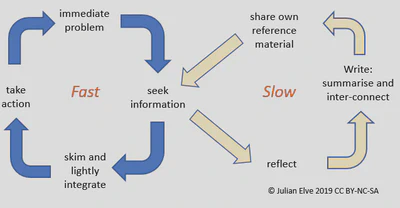Sensemaking
Harold Jarche posted this week about the workflow of learning, in which he talked a little about his own practice of sense-making counter-pointed with a reminder that Personal Knowledge Management has to be personal if it’s to stick.
In the comments I said:
There’s definitely a thing about volume and practice. I have to read, sift, link and synthesise technical stuff voraciously for my work, and it comes very naturally to bang out intermediate notes to contextualise a new piece of knowledge [even if many are behind the firewall]. My wider interests seem to work on a much longer cycle – it can be weeks until I see a link or pattern of thought I want to express. I suspect there are also links to self-confidence. I know that I know a lot in my professional sphere but that equally there are always orders of magnitude more I could know – because I am actively thinking about that stuff most waking hours I’m in the flow a lot of the time. With other areas I’m often conscious that the others in the conversation know far more (e.g. you Harold on this topic!) so I’m sometimes reticent to add my contribution. And I really struggle with the stream-of-consciousness style of blogging outside of work stuff – none of that ever really feels like something I want to share…
Reflecting
While thinking about this post I checked my FedWiki notes on sense-making, and see the only nugget I’ve added there so far is forked from Ward Cunningham on the topic of Reflection Workflow :
writing and rereading reflections enhances systematic understanding … Intense and focused work succeeds by keeping many facts and opportunities close at hand in short-term memory. During these episodes write quickly and copy freely addressing mostly your present self. … Use quiet periods to reflect on recent activities allowing yourself to summarize and interconnect experiences. Write slowly choosing words carefully. Start new pages and label them to be found later.
There’s clearly a link between that and my earlier comment. The experience of sense-making that operates on at least two speeds.

The hurly-burly of daily focused work is closely matched by the first paragraph, and that’s the form of sense-making I find comes most easily. The emphasis is on speedy seeking of knowledge relevant to the task in hand, and just enough synthesis to inform immediate action and to carry the thought forward to the next day or the next week.
The second part - quiet reflection and slow writing to interconnect experiences - is the part I find hardest, and that I do least in an explicit form. Clearly some level of integration happens sub-consciously, else my knowledge would be transient, but the point of these practices is to improve through making explicit.
To some extent this is about forcing practice until it is in the muscle - perhaps I need to develop katas for slow sense-making. For the rest it’s not about the techniques, it’s about choices I make about a limited resource, time and energy.